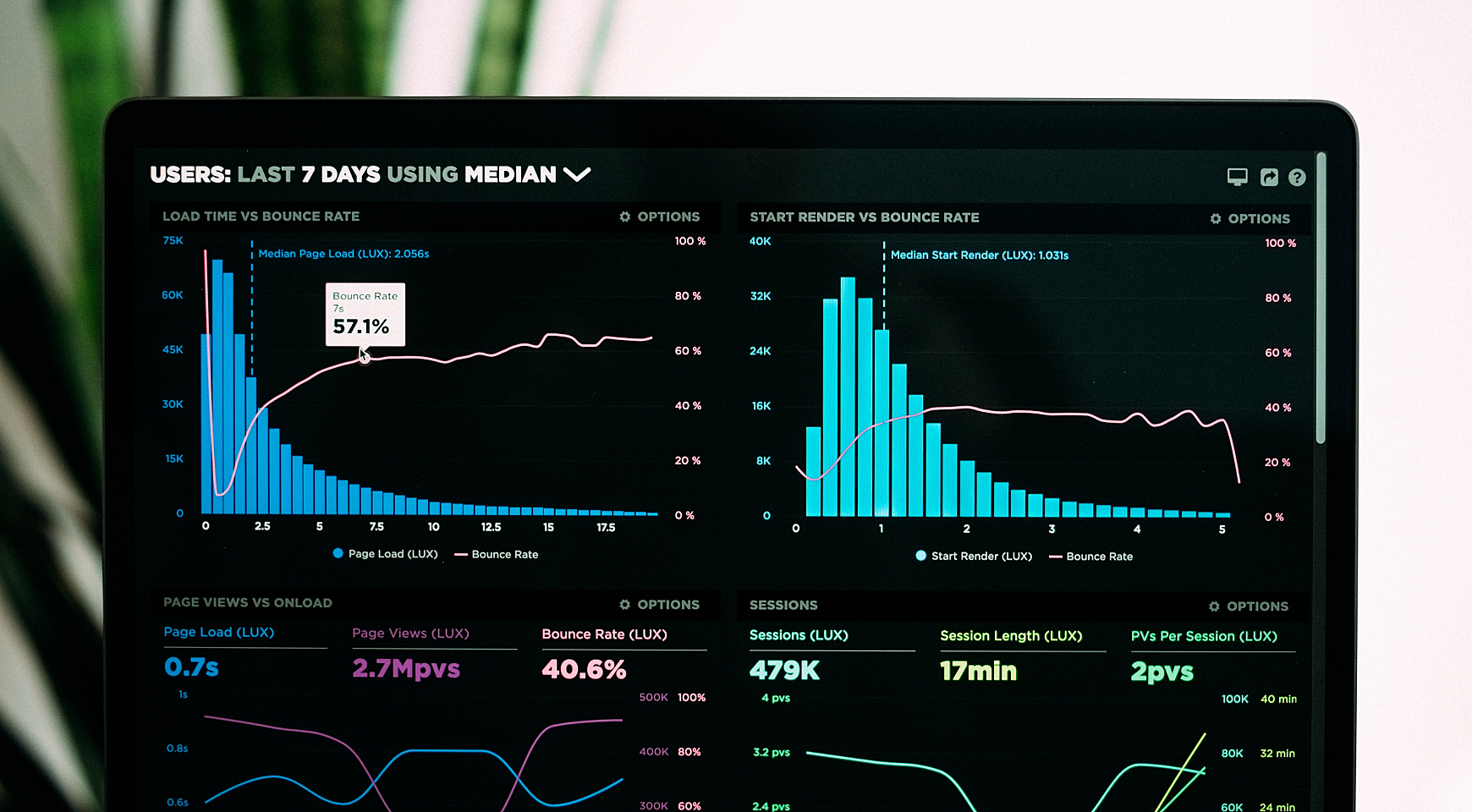
LMS data analytics is a game-changer in the world of education. The ability to gather and analyze data from learning management systems opens up a whole new world of insights and possibilities. Imagine being able to track student progress in real-time, identify areas where they are struggling, and provide targeted interventions to help them succeed. This is what LMS data analytics allows us to do, and it's truly exciting.
In this article, we talk about how learning platform with big data brings the corporate learning experience to a whole new level. Also, we’ll show how to use and implement Big Data in your LMS and demonstrate Learning Analytics capabilities.
How To Use Big Data In eLearning?
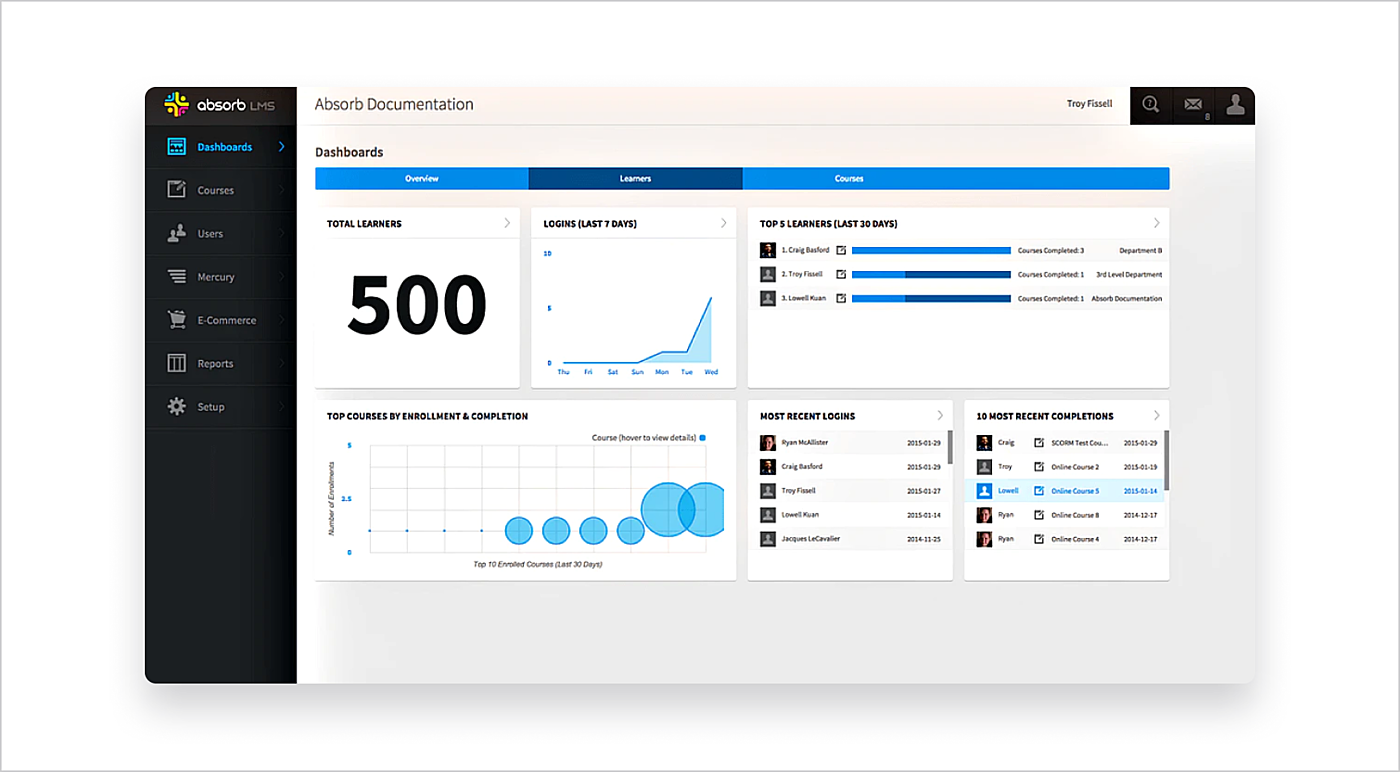
By harnessing the power of Big Data, eLearning platforms can gain valuable insights into learner behavior, preferences, and performance. This data can be used to personalize the learning experience, identify areas of improvement, and make data-driven decisions. One way to use Big Data in eLearning is by tracking learner progress and performance. Big Data can help eLearning platforms optimize their course offerings by analyzing data on learner engagement and satisfaction. By identifying popular courses and topics, eLearning platforms can develop new content that aligns with learners' interests and preferences.
What Are the Types of Big Data Used in an LMS?
- Completion Rates. The data shows if your employees/students are actually completing the eLearning course and how long it takes them to finish up each task or module. It also gives you a good indication of the learning program’s effectiveness. If most of the learners are unable to complete the course, it’s a sure sign to reevaluate your e-learning strategy.
- Performers and progress of your learners. Using Big Data for learning management system brings insight into learning behaviors, experience, and proficiency.
- Assessment scores. The percentage of passing grades gives you the power to identify online learners' strengths and weaknesses, which you use to personalize learning paths.
- Surveys. This is a direct form of feedback, where you can find out honest opinions and recommendations.
- Peer-Based Feedback. Social media groups, forums, online group collaboration projects, and learner-generated online content are the sources of peer-based feedback. With their help, you can see how online learners respond in social environments.
Are Data Analytics Used in the LMS?
Learning Analytics in LMS is the set of techniques aimed to extract useful information from an existing online education database.
There are two goal categories of Data Analytics in LMS:
- Educational — enhance online education impact and learners’ performance by reducing dropouts, improving success rate, and tutoring capabilities.
- Business — improve the return of investment (ROI) of training by reducing tutoring costs and streamlining the educational process.
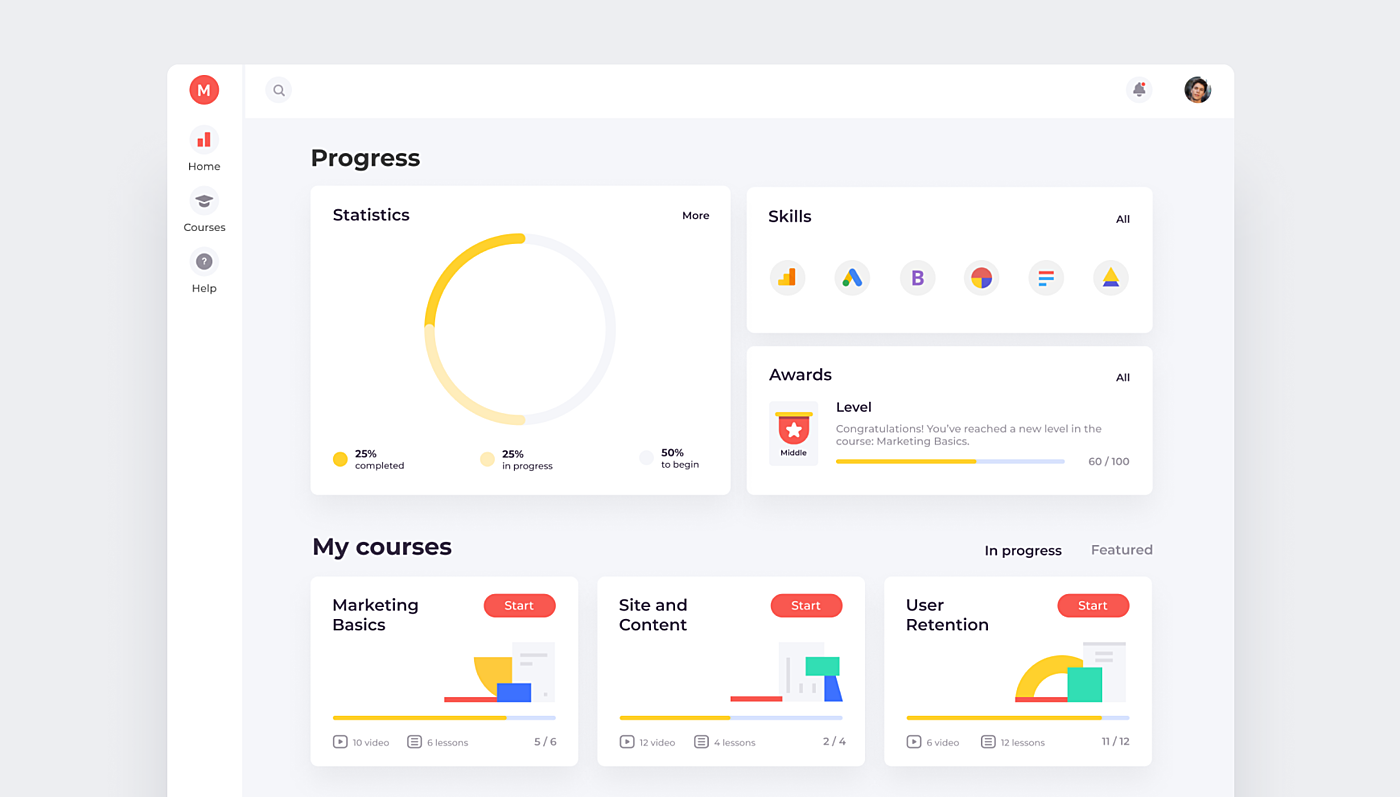
How LMS May Benefit From Adopting Learning Analytics
There is one major reason why companies adopt Data Analytics in LMS — to streamline the learning process cutting costs on employees’ training. Next, we will focus on how the use of Data Analytics in the LMS industry can benefit companies:
Training Engagement Assessment
A learning management system essentially is a centralized repository of e-learning programs and learners’ data. Companies have the ability to analyze Big Data in LMS software to gain valuable insights into the learners’ behavior, besides tracking completion rates, enrollments, etc.
Big Data and Learning Analytics provide professionals with instant insights into their learners’ learning habits and patterns and their engagement with the modules. This information helps assess the efficiency and validity of the e-learning courses.
Maximized Training Efficiency
The major advantage of an LMS with a Data Analytics function is the efficient measurement of training effectiveness. You can extract and analyze the data trends across the training modules, and compare them at different stages of the training process.
This way you get valuable insights on the influence of e-learning programs’ design or learner background on particular training results. For example, instructional designers can use this information and improve the training programs’ design to suit the needs of the learners.
Real-Time Reports Generation
A learning platform with Big Data and Learning Analytics can provide real-time and accurate reports by tracking learners’ activity and progress. You can easily generate multiple reports, further categorized based on courses, employees or business function.
The primary advantage of real-time reporting is that it offers the ability to interfere whenever there is an issue or if a learner is struggling and needs help.
Integration with CRM and HRMS
A lot of global organizations offer extended enterprise training to their customers and partners. In this case, LMS integration with a CRM tool is of key importance.
Such integration enables companies to find out if sales channels are generating more business by taking online training. Or are partners more informed about the organization’s solutions and policy? CRM integration also helps to efficiently measure the ROI provided by any training program.
LMS can also be integrated with HRMS, which enables the company to analyze the correlations between employee training and attrition or satisfaction.
This information can be used to personalize training while offering valuable feedback to organizational leaders about certain employees’ leadership capabilities.
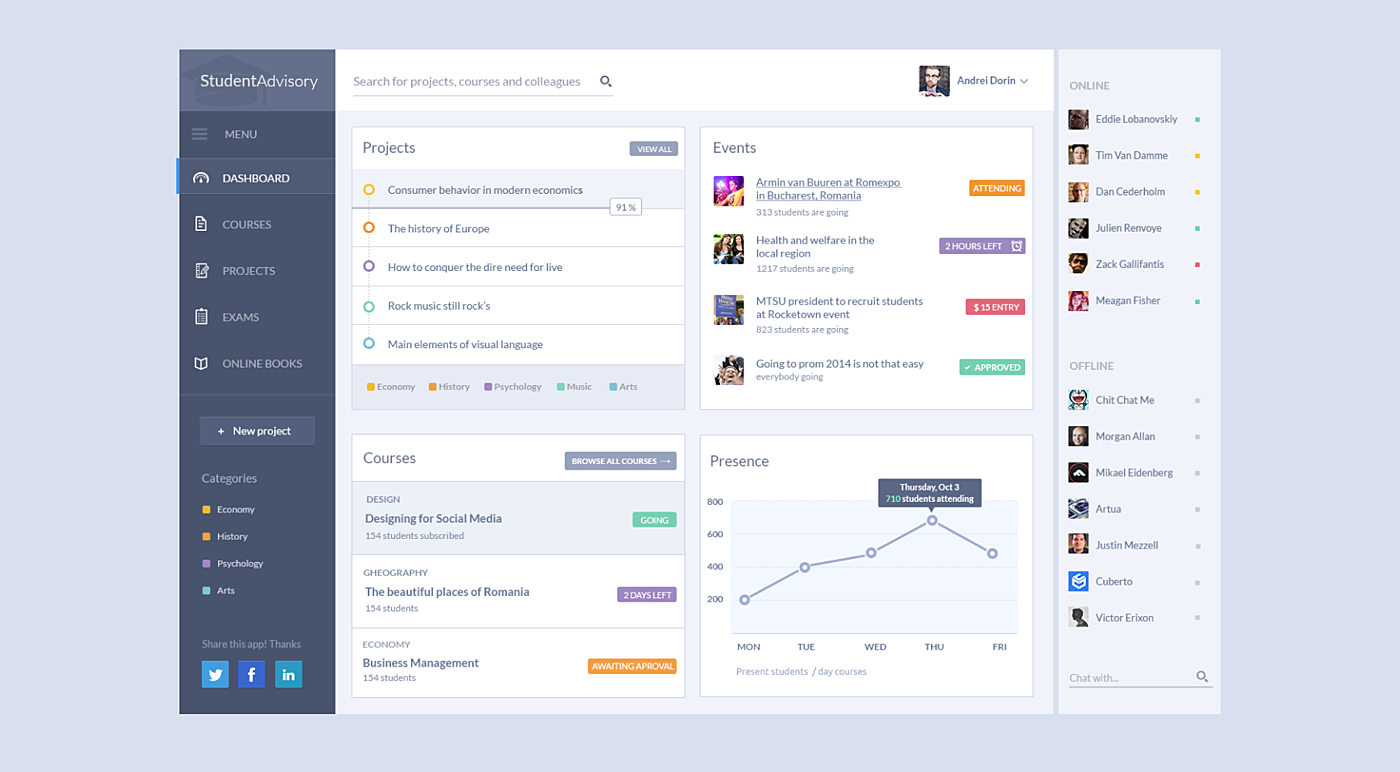 Source: Dribbble
Source: Dribbble
Cost-Effectiveness Analysis
Companies seek in-depth information about the effective utilization of online training and the resources spent. The true effectiveness of the training programs can only be realized through Learning Analytics.
For example, organizations know that sales representatives need soft skills to handle customers effectively. However, the need for specific soft-skills training can be understood by conducting a pre-assessment on existing skill levels. If the stakeholders are satisfied with the existing skill levels then there is no need to invest in that particular training.
What companies can do instead is to offer training on customer-handling, which will give sales reps tools to engage and satisfy their customers.
What’s more, Data Analytics in LMS also offers insights into how companies can effectively use available training budgets, thus maintaining cost efficiency.
You may be interested in reading our guide on how to develop Udemy like website.
Use Cases: How Big Data & Learning Analytics Could be Used in LMS
Personalizing Online Training
Every learner has a unique learning style, so online training programs should adhere to a learner-first approach. Big Data & Learning Analytics in LMS helps to tailor the courses to your users’ needs. Personalization increases learners’ engagement and improves the quality of knowledge.
Here are some of the most useful metrics for measuring the effectiveness of each learner’s learning process.
- Completion rates
- When a user last logged in
- Students' progress
- Course status
- Total time spent training
- Learning path data (how far in the course a learner is)
- Assessment scores and answers
- The number of answer attempts.
However, simply tracking metrics is not enough to provide accurate insights to improve training. That’s why the LMS provides analytic reports on the following data:
- Enrollment Status. This report demonstrates the number of students that are enrolled and unenrolled, who is passing the course, as well as minor learner activity data.
- Learner Progress. The report lets you know where exactly learners are in their training journey and who is lagging behind.
- Learner Activity. Here, you can see learner patterns: what materials learners interacted with the most and if there were parts of the course that were skipped.
- Potential Problems. This report analyzes the learner assessment data to show certain course materials that many employees are struggling with.
Find out how AI and gamification in e-learning projects may boost learner engagement.
Identifying Skill Gaps
Big data in LMS provide you with a clear insight into the strengths and weaknesses of your learners. You can generate real-time reports on the performance of your employees, see what skills they may be lacking, and provide expert assistance at the right time during the training.
Mitigating Risks by Monitoring Compliance
Employee learning and development is essential for risk management. The consequences of employees failing to complete essential training programs on topics such as health, compliance, and safety can prove expensive as well as potentially dangerous for a company. The LMS can mitigate risks by monitoring training compliance in your organization.
Upon logging into the corporate LMS, employees in the organization see notifications reminding them to complete training programs. Of course, it would be easy for your employees to miss out on these notifications. However, the LMS mitigates this risk by sending email alerts to learners in addition to the notifications, reminding them of the mandatory training program that they have to complete.
With compliance training, learners often must complete refresher training programs in order to remain compliant. The LMS sends notifications informing employees of automatic course enrollment and providing reminders of the due date for course completion.
Making use of Data Analytics in the LMS can also help managers to keep track of the employees who take training programs seriously, and those who require more motivation or support in order to complete training programs.
Improving Online Training Programs
Another way how Big Data may improve e-learning industry is by analyzing how trainees are interacting with each module of online training. You see what topics they may find confusing or difficult to learn, what content formats are more and less effective, and which modules take too much time to complete.
If you compare employee’s testing scores against all the previous scores in your database, you can come up with effective methods for improvement.
Read also how to improve conversion by the right educational website design.
Agente Experience
Our team can help with the implementation of LMS data analytics into your eLearning platform to gain insights, make informed decisions, and create personalized learning experiences for your users.
Incorporating LMS data analytics effectively reduces software project risk by ensuring that the platform evolves based on actual user needs and behaviors.
This solution will help not only improve the effectiveness of your LMS platform but also empower to continuously enhance the learning journey for the learners. By upgrading your LMS to LXP, we can further augment and personalize the educational environment, delivering even more dynamic and engaging learning experiences.
Agente has been providing custom LMS development for companies of a different scale: from LMS for healthcare to enterprises. Our Big Data and Learning Analytics LMS are designed to:
- Provide a whole-spectrum learning (employee training, orientation, knowledge retention);
- Reduce workload by streamlining the learning process;
- Reduce costs connected with face-to-face learning and development.
If that’s what your business needs, reach out.
For the Finale
Big Data has completely transformed various industries, and the eLearning sector is certainly no exception. The significance of Big Data in eLearning is rapidly growing due to its ability to gather, analyze, and interpret extensive amounts of information.
This data offers valuable insights into the learning patterns, preferences, and performance of students. By utilizing this knowledge, eLearning platforms can personalize the learning experience to cater to the unique needs and abilities of each student.
Additionally, Big Data analytics can identify areas for improvement in eLearning content and delivery methods, enabling continuous enhancement and optimization.
Consequently, Big Data is revolutionizing eLearning by making it a more efficient and effective educational tool.
Rate this post!
633 ratings, average ratings is 4.7 out of 5
Frequently asked questions
Whether you represent a private business, a large enterprise or an educational institution, our e-learning platform development services will greatly improve the performance of your company.
How does Big Data benefit your LMS?
The integration of Big Data into Learning Management Systems has the potential to revolutionize education. By harnessing the power of data analytics, LMSs can provide personalized learning experiences that improve student outcomes, enhance engagement, and inform instructional design.
What types of data are collected in an LMS for analytics purposes?
One of the most important types of data collected in an LMS for analytics purposes is user activity data. This includes information on which courses a user has enrolled in, how long they spend on each course, and how frequently they access the learning materials. Another type of data collected in an LMS for analytics purposes is assessment data. This includes information on how users perform on quizzes, exams, and other assessments within the system. By analyzing this data, educators can gain insights into student progress and identify areas where additional support may be needed.
How can educators and administrators use analytics from Big Data?
This powerful tool allows them to gain valuable insights into student performance, learning patterns, and educational trends. With the ability to analyze large sets of data, educators can make informed decisions about curriculum design, instructional strategies, and student support systems. They can identify areas where students may be struggling and provide targeted interventions to improve learning outcomes.
How can Big Data analytics help in corporate training through an LMS?
One of the key benefits of Big Data analytics in corporate training is its ability to identify knowledge gaps and tailor training content accordingly. By analyzing the data generated by employees' interactions with the LMS, organizations can pinpoint areas where employees are struggling and provide targeted resources to address those gaps.
Related Posts
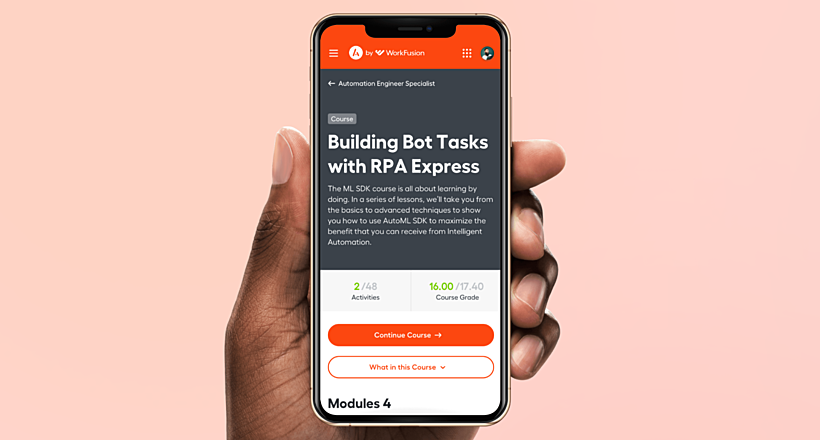
Develop Custom Corporate Microlearning Platform
Custom microlearning solutions for corporate training: Discover how to develop a tailored platform for efficient and engaging employee learning

24 January 2024
Employee Training Management Software Development in 2024: Features and Cost
Streamline your employee training with cutting-edge software solutions. Explore the features and costs of employee training management software.

LMS gamification in 2024: Benefits, Types, and Examples
Discover how LMS gamification boosts engagement, improves knowledge retention & inspires mastery. Explore types & examples.

How to Design and Redesign an LMS in 2024: Benefits and Use Cases
Step into the future of learning with our guide on designing and redesigning an LMS in 2023. Discover the benefits, explore real-world use cases.

How to Create Online Course Website: A Full Guide
Discover how to build an online course website with our comprehensive guide, offering step-by-step instructions, tips, and best practices for educators.

Education Technology Trends to Watch Out In The Future
Explore the latest trends in educational technology and discover what's transforming the future of learning.
Let's talk
Is there a challenge your organization or company needs help solving? We’d love to discuss it.

Managing Director, Partner
Andrew Terehin

Thank You!
Your message has been successfully sent.
We will contact you very soon.







